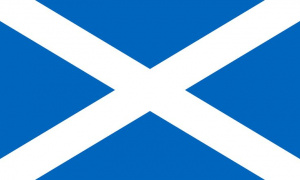Language/Scottish-gaelic/Grammar/Adjectives
Hi Scottish Gaelic learners! 😊
In this lesson, we will be discussing Adjectives in Scottish Gaelic. Adjectives are used in a sentence to describe or modify a noun. They are usually placed after the noun in Scottish Gaelic.
Let's get started!
Take a moment to explore these relevant pages as you conclude this lesson: Personal pronouns, Negation, Conditional Mood & Give your Opinion.
Basic Adjectives[edit | edit source]
In Scottish Gaelic, adjectives usually follow the noun they modify. For example, "muileann uaine" translates to "green mill," here "uaine" (green) is an adjective describing the "muileann" (mill)
Here are some examples of basic adjectives in Scottish Gaelic:
| Scottish Gaelic | Pronunciation | English |
|---|---|---|
| tioram | chi-ram | dry |
| fliuch | flewk | wet |
| fada | fa-da | long |
| corrach | kor-ruch | round |
| caol | kohl | thin |
| trom | trom | heavy |
Comparative Adjectives[edit | edit source]
Scottish Gaelic has comparative adjectives to show that one thing is "more/less" than another. To do this, you add "-as" to the end of the adjective to show that it is being compared to another. For example:
- am fear as sine - the oldest man
In this sentence, "as sine" is the comparative form of the adjective "sine."
Here are some examples of comparative adjectives in Scottish Gaelic:
| Scottish Gaelic | Pronunciation | English |
|---|---|---|
| nas sine | nahs shin-uh | older |
| nas ìsle | nahs eel-uh | lower |
| nas fhearr | nahs yarr | better |
Superlative Adjectives[edit | edit source]
Scottish Gaelic has superlative adjectives to show the highest degree of a quality. To do this, you add "-aich" to the end of the adjective. For example:
- am fear as sineach - the oldest man (superlative form)
In this sentence, "as sineach" is the superlative form of the adjective "sine."
Here are some examples of superlative adjectives in Scottish Gaelic:
| Scottish Gaelic | Pronunciation | English |
|---|---|---|
| as sineach | ush shin-uh-uhk | oldest |
| as ìsle | ush eel-uh | lowest |
| as fheàrr | ush yarr | best |
Adjective Agreement[edit | edit source]
Adjectives in Scottish Gaelic agree with the noun they describe in gender and number.
For example, if "cù" (a dog) is masculine:
- cù beag (small dog) - Here "beag" (small) is singular and masculine to agree with "cù"
Similarly, if "caileag" (a girl) is feminine:
- caileag bhreagha (beautiful girl) - Here "breagha" (beautiful) is singular and feminine to agree with "caileag."
If the noun is plural, the adjective must also be plural. For example:
- càirdean mòra (big friends) - Here "mòra" (big) is plural to agree with "càirdean" (friends).
Dialogue Example:
- Person 1: Tha an uan-uaine seo cho liath. (This lamb is so grey.)
- Person 2: Tha sin ceart, tha e truagh gun deach e don spìse. (That's true, it's a pity he didn't go to the vet.)
Tip: To improve your Scottish Gaelic find native speakers and ask them any questions.
We hope you enjoyed this lesson on Scottish Gaelic adjectives! For more grammar lessons, visit our Grammar page. 😊
➡ If you have any questions, please ask them in the comments section below.
➡ Feel free to edit this wiki page if you think it can be improved. 😎
Other Lessons[edit | edit source]
- Future Tense
- Plurals
- How to Use Be
- Pronouns
- Questions
- Personal pronouns
- How to Use Have
- Negation
- Conditional Mood

